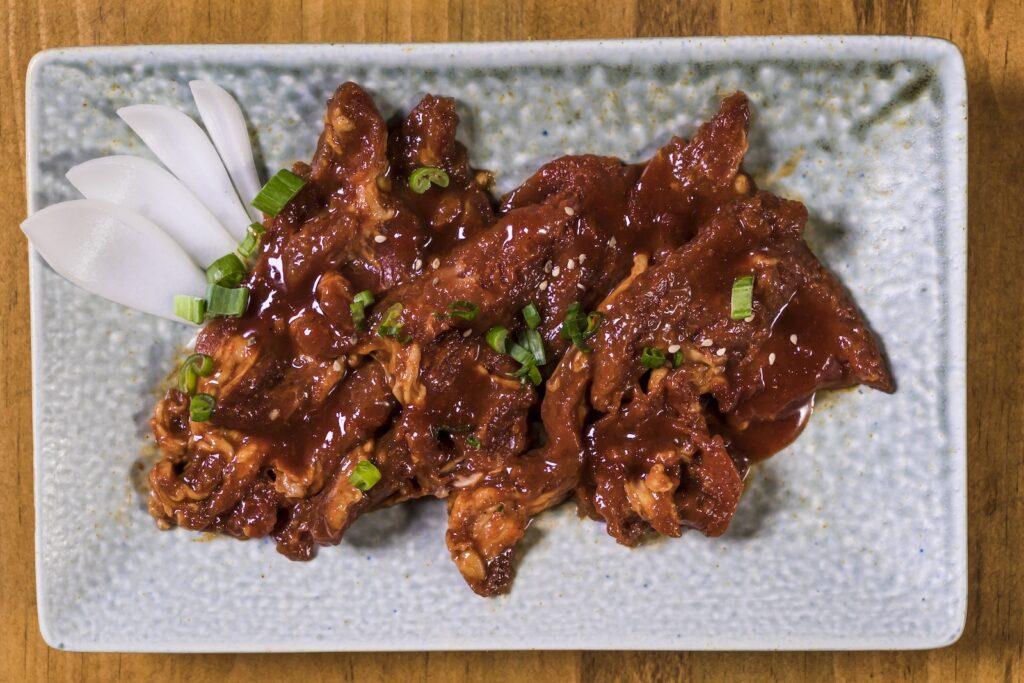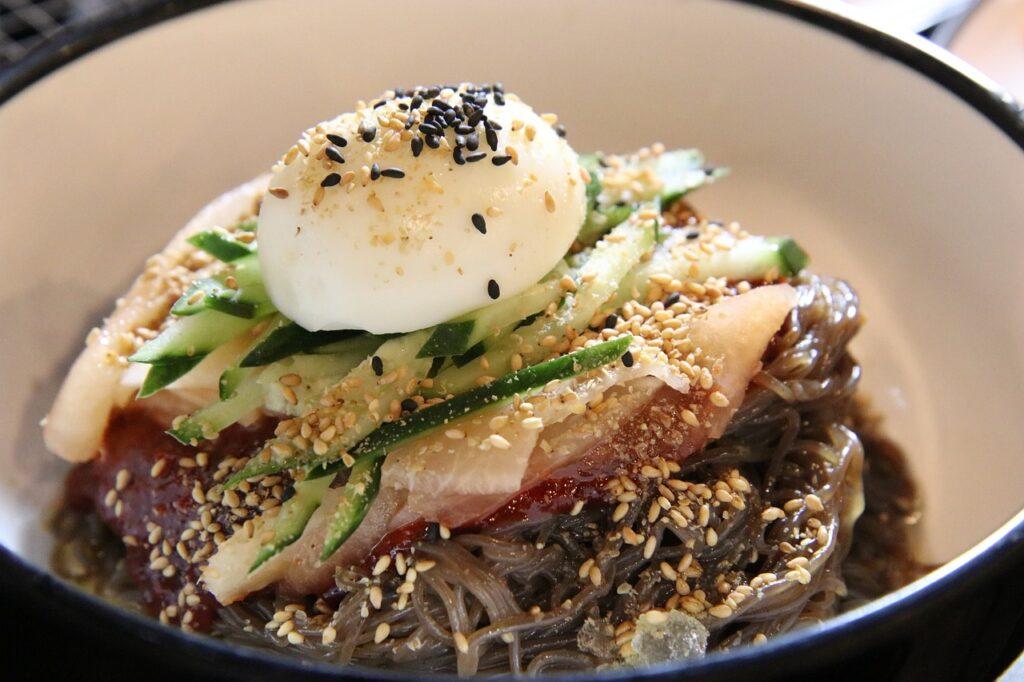Looking for great Korean BBQ sauce recipe? Korean barbecue sauce is a delicious and versatile condiment that adds a unique and bold flavor to various dishes. With its combination of sweet, savory, and spicy elements, it has become increasingly popular in both Korean cuisine and international cooking. In this article, we will delve into the ingredients, alternatives, and traditional Korean sauces while exploring the differences between Korean BBQ sauce and other popular sauces like Japanese BBQ sauce. We will also discuss the distinction between Korean BBQ sauce and bulgogi, a well-known Korean grilled dish.
Ingredients of Korean BBQ Sauce
Korean BBQ sauce typically consists of a blend of various ingredients that contribute to its distinct flavor. Traditional ingredients include soy sauce, garlic, ginger, sesame oil, sugar, and Korean chili paste (gochujang). These elements come together to create a complex balance of flavors, combining sweetness, umami, and a hint of spiciness. However, there are also variations of Korean BBQ sauce that incorporate additional ingredients like pear or apple puree for a touch of fruitiness, rice vinegar for acidity, or even fish sauce for added depth.
Korean BBQ Sauce Recipe
This Korean barbecue sauce is easy to make, versatile, and full of irresistible sweet and savory flavor.
Korean BBQ Sauce Ingredients
To make this Korean barbecue sauce recipe, you’ll need: soy sauce, dark brown sugar, minced garlic, rice wine vinegar, chile-garlic sauce, ground black pepper, fresh ginger, Asian sesame oil, cornstarch, and water.
Ingredients
- 1 cup soy sauce
- ¾ cup dark brown sugar
- 2 tablespoons minced garlic
- 1 tablespoon rice wine vinegar
- 1 tablespoon chile-garlic sauce (such as Sriracha®) (Optional)
- 1 ½ teaspoons ground black pepper
- 1 teaspoon grated fresh ginger
- 1 teaspoon Asian (toasted) sesame oil
- 1 tablespoon cornstarch
- 1 tablespoon water
Directions
- Stir soy sauce, brown sugar, garlic, rice wine vinegar, chile-garlic sauce, pepper, ginger, and sesame oil together in a saucepan; bring to a boil.
- Whisk cornstarch and water together in a small bowl until the cornstarch dissolves; pour into boiling soy sauce mixture. Reduce heat to medium-low and cook until the sauce is thick, 3 to 5 minutes.
How to Make Korean BBQ Sauce
You’ll find the full, step-by-step instructions below — but here’s a brief overview of what you can expect when you make Korean barbecue sauce at home:
- Stir the first eight ingredients in a saucepan and bring the mixture to a boil.
- Whisk the cornstarch and water in together, then pour it into the boiling mixture.
- Reduce the heat and whisk until the sauce is thick.
How to Use Korean BBQ Sauce
This flavorful Korean barbecue sauce pairs perfectly with pork, chicken, beef, or salmon. Use it as a marinade, glaze, dressing, dipping sauce, or condiment.
How to Store Korean BBQ Sauce
Transfer the Korean barbecue sauce to an airtight container. Store in the refrigerator for up to one week or freeze for up to one month.

Alternatives to Korean BBQ Sauce
If you’re looking for alternatives to Korean BBQ sauce, there are several options available. Hoisin sauce, for example, can be used as a substitute due to its similar sweet and savory profile. Teriyaki sauce, although originating from Japanese cuisine, can also be a viable alternative with its combination of soy sauce, sugar, and other seasonings. Additionally, you can experiment with homemade alternatives by combining soy sauce, honey or brown sugar, garlic, ginger, and a dash of chili flakes to achieve a similar flavor profile.
Comparison to Japanese BBQ Sauce
While Korean and Japanese BBQ sauces share some similarities, they also have distinct differences. Japanese BBQ sauce, known as yakitori sauce or tare, has a milder and sweeter flavor compared to Korean BBQ sauce. It often contains soy sauce, mirin (sweet rice wine), sake (rice wine), sugar, and sometimes ginger or garlic. Japanese BBQ sauce is commonly used as a glaze for grilled meats and vegetables, while Korean BBQ sauce is a versatile marinade and dipping sauce that complements a wide range of dishes.
Traditional Korean Sauces
In addition to Korean BBQ sauce, Korean cuisine boasts a variety of other traditional sauces. Some popular examples include ssamjang, a spicy and savory sauce made with fermented soybean paste (doenjang) and gochujang, which is commonly used as a condiment for wraps and lettuce wraps. Another well-known Korean sauce is ganjang, a soy sauce made from fermented soybeans, which adds rich umami flavors to dishes. Each sauce has its own unique taste and purpose, adding depth and complexity to Korean cuisine.
The Appeal of Korean BBQ
Korean BBQ is not just about the sauce, but also the cooking technique and overall experience. The combination of grilling thinly sliced marinated meats, along with a plethora of accompanying side dishes (banchan), creates a communal and interactive dining experience. The smoky flavors from the grill, coupled with the bold and delicious flavors of the Korean BBQ sauce, make it an unforgettable culinary experience.
Difference between Bulgogi and Korean BBQ Sauce
Bulgogi is a well-known Korean grilled dish made with thinly sliced beef, marinated in a combination of soy sauce, sugar, sesame oil, garlic, and other seasonings. While Korean BBQ sauce is often used as a marinade for bulgogi, the two are not the same. Korean BBQ sauce is a broader term that encompasses various sauces used for grilling and dipping, while bulgogi refers specifically to the marinated grilled beef dish.
Is Korean BBQ Sauce like Bulgogi?
Although Korean BBQ sauce and bulgogi share common ingredients and flavors, they are not identical. Bulgogi marinade typically includes soy sauce, sugar, sesame oil, garlic, and ginger. On the other hand, Korean BBQ sauce can have additional ingredients like gochujang, pear puree, or fish sauce. While both can be used interchangeably in some cases, the specific flavors and intended uses may vary.
Conclusion
Korean BBQ sauce offers a delicious blend of sweet, savory, and spicy flavors that make it a favorite condiment in Korean cuisine. With its versatility and ability to enhance various dishes, it has gained popularity worldwide. Whether used as a marinade, glaze, or dipping sauce, Korean BBQ sauce adds a unique and delightful taste to grilled meats, vegetables, and more. So, next time you’re looking to elevate your culinary experience, consider incorporating the bold and flavorful Korean BBQ sauce into your cooking repertoire.
FAQ
What is Korean BBQ Sauce made of?
Korean BBQ Sauce is typically made with a combination of soy sauce, garlic, ginger, sugar, sesame oil, and Korean chili paste known as gochujang. However, there can be variations in the ingredients used to create different flavors and spice levels.
What can I use instead of Korean BBQ Sauce?
If you don’t have Korean BBQ Sauce on hand or prefer a different flavor, you can try using a combination of soy sauce, honey or brown sugar, garlic, ginger, and a pinch of red pepper flakes as a substitute. Alternatively, you can explore other Asian marinades or sauces like teriyaki or hoisin sauce.
Is Japanese BBQ sauce the same as Korean BBQ Sauce?
Although both Korean and Japanese BBQ sauces are used for grilling meats, they have distinct differences in their ingredients and flavor profiles. Japanese BBQ sauce, also known as yakitori sauce, is sweeter and milder compared to the spicier and more savory Korean BBQ Sauce.
What is traditional Korean sauce?
Traditional Korean cuisine includes various sauces, but one of the most popular is gochujang, a fermented chili paste made from red chili peppers, glutinous rice, fermented soybeans, and salt. Gochujang is used in many Korean dishes to add spicy and savory flavors.
What makes Korean BBQ so good?
Korean BBQ is highly regarded for its delicious flavors and unique cooking experience. The combination of marinated meats, the smoky char from the grill, and the assortment of accompanying side dishes known as banchan create a harmonious and satisfying dining experience.
What makes Korean BBQ different?
Korean BBQ differs from other types of BBQ because it focuses on grilling marinated meat, typically beef, pork, or chicken, at the table. The meats are often thinly sliced and marinated in a flavorful sauce before being grilled, resulting in tender and flavorful bites.
What is the difference between bulgogi and Korean BBQ Sauce?
Bulgogi refers to a specific Korean dish made with thinly sliced beef marinated in a mixture of soy sauce, sugar, garlic, sesame oil, and other ingredients. On the other hand, Korean BBQ Sauce is a sauce used to marinate and glaze various meats for grilling, including bulgogi.
Is Korean BBQ Sauce like bulgogi?
Korean BBQ Sauce can be used to make bulgogi by marinating the meat in the sauce. However, they are not exactly the same. Bulgogi has its own distinct marinade, while Korean BBQ Sauce can be used for a variety of grilled meats and dishes beyond bulgogi.
What is the difference between bulgogi and Korean BBQ?
Bulgogi specifically refers to the marinated and grilled beef dish in Korean cuisine. Korean BBQ, on the other hand, is a broader term encompassing various grilled meats, including bulgogi. Korean BBQ can include different types of meats, such as pork, chicken, or seafood, while bulgogi is focused solely on beef.
Last updated: October 23, 2023


